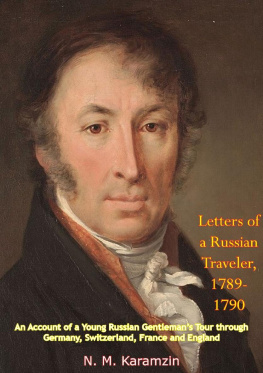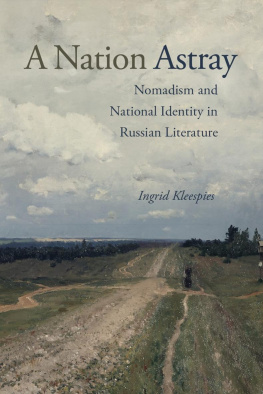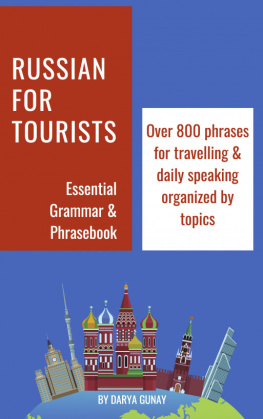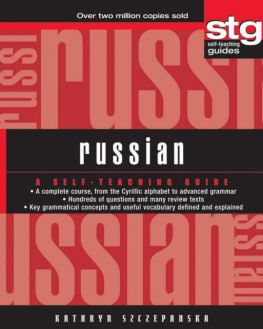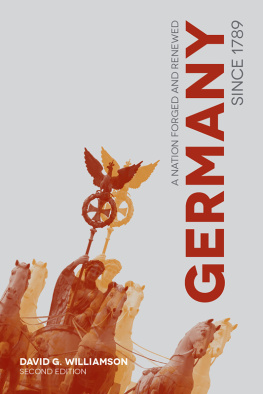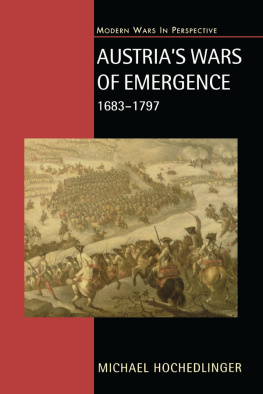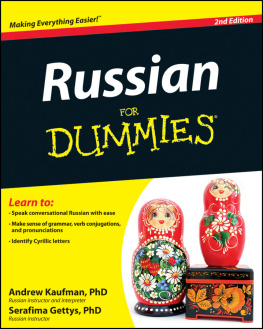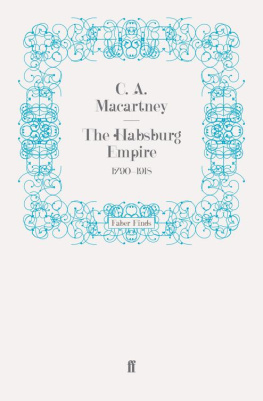This edition is published by BORODINO BOOKS www.pp-publishing.com
To join our mailing list for new titles or for issues with our books borodinobooks@gmail.com
Or on Facebook
Text originally published in 1957 under the same title.
Borodino Books 2018, all rights reserved. No part of this publication may be reproduced, stored in a retrieval system or transmitted by any means, electrical, mechanical or otherwise without the written permission of the copyright holder.
Publishers Note
Although in most cases we have retained the Authors original spelling and grammar to authentically reproduce the work of the Author and the original intent of such material, some additional notes and clarifications have been added for the modern readers benefit.
We have also made every effort to include all maps and illustrations of the original edition the limitations of formatting do not allow of including larger maps, we will upload as many of these maps as possible.
LETTERS OF A RUSSIAN TRAVELER
1789-1790
An Account of a Young Russian Gentlemans Tour
Through Germany, Switzerland, France, and England
BY
N. M. KARAMZIN
Translated and Abridged by
FLORENCE JONAS
Introduction by
LEON STILMAN
TABLE OF CONTENTS
Contents
TABLE OF CONTENTS
DEDICATION
THIS TRANSLATION IS DEDICATED
TO MY SON STEVEN
PREFACE
TRAVELING, in its richest sense, has to do with movement in time as well as in space, and it was this approach to one of lifes most enriching experiences which drew me to this particular traveler. For Karamzin moved not only from place to place, but also from age to agefrom his own time backwardand forward into ours.
With the unbounded curiosity and interest, the continuous quest and sensibility so typical of his century, he recorded not only his impressions of people and places but also his reactions to ideas, his attitude toward attitudes. He posed questions. He offered answers. And, though he was limited, as everyone is, by his own age, many of his questions and answers appear so modern that one can only ask, Is this eighteenth-century, twenty-two-year-old enlightened youth not typical of the enlightened youth of every era?
It was because these letters are so fresh, so alive, so current, that I wanted to share them. And therefore, this translation.
Actually, Karamzin wrote more than is presented here. The selection of material has not been easy. In order to preserve the smooth flow of Karamzins writing I have avoided the use of deletion marks. In most cases I have included entire letters, but I have also omitted letters or retained only excerpts. Karamzin visited and described many churches, monuments, and other sights of interest to travelers. He also poured forth his feelings in lengthy sentimental passages. In the belief that this tends to become repetitious and might therefore prove cloying to the modern reader, I have chosen only those sections which I feel reveal, most interestingly, both Karamzins literary ability and particular interests and the social and intellectual atmosphere of his time. All of his meetings with important persons are, of course, included.
In translating the letters, I have striven to achieve smoothness and clarity, without sacrificing either the spirit or style of the author. The sprinkling of foreign words and expressions which Karamzin himself used has been retained.
For me it has been a joy and a privilege to journey through Europe with Karamzin. However, I feel that I could not have arrived at my destination without the aid of the following persons. To Professor Ernest J. Simmons I am deeply indebted for his interest, encouragement, and invaluable suggestions. I am also grateful to Professor Henry M. Nebel, Jr., Northwestern University, for his help in selecting and editing certain portions of the letters. To Professor Leon Stilman I wish to express my heartfelt appreciation for his wise counsel and his interesting and illuminating introduction, which gives us so full an understanding of Karamzin, the author and the man. For their unstinting and ever-willing assistance in the preparation of the manuscript I wish to thank Dr. William Bridgwater, Miss Elisabeth Shoemaker, and Miss Barbara Melissa Voorhis.
FLORENCE JONAS
INTRODUCTION BY LEON STILMAN
NIKOLAI MIKHAILOVICH KARAMZIN (1766-1826) is identified in Russian literary history with the sentimentalist movement of which he was the uncontested leader, if not the initiator. Karamzin dedicated himself to a career of letters very early in his life, publishing translations, short essays, narrative sketches and poetry. In the 1790s, the Letters of a Russian Traveler and several short stories brought him wide recognition and established him as the leading literary figure of the younger generation.
Much of Karamzins work appeared initially on the pages of several literary journals and yearlies of which he was founder, editor, and publisher. Then, when, in 1801, the short and insanely oppressive reign of Paul I came to a sudden end, and Alexander I inaugurated a more liberal era, it became possible to depart from the previously narrow formula of the literary journal and to touch, however cautiously, upon political problems. Before the year was out, Karamzin had founded the European Herald , the most memorable of his publishing ventures and the first review in Russia to give any substantial amount of its space to articles on political affairs, especially those concerning the European scene, and most of these were contributed by Karamzin himself.
The next stage of his career began in 1803, when, at his own request, Alexander I officially appointed Karamzin historiographer of Russia. Receiving a yearly allowance, he could thereafter devote himself entirely to his project, a monumental History of the Russian State. As if to foreshadow this new phase, Karamzin had expressed in the Letters of a Russian Traveler the view that till now we have had no good history of Russia, that is, one written with philosophical understanding, a critical spirit and noble eloquence. The models for such a history, he thought, were Tacitus, Hume, Robertson, and Gibbon, and with these in mind, with intelligence, taste, and talent and the ability to select, enliven, and add color, he believed one could extract from the old Russian chronicles something attractive, powerful, deserving the interest not only of Russians, but of foreigners as well.
By 1818 the first eight volumes of the History were completed and published. Their success was triumphal: the 3,000 copies of the first printing were sold in less than a month. Karamzin continued his labors on the History during the remaining years of his life, but he did not live long enough to complete his work. In 1826, he died while working on the twelfth volume, which dealt with the early seventeenth century.
Karamzin, as Russias official historiographer, was a close and respected friend of Alexander I, especially after 1818, even though the opinions he expressed and the advice he offered often failed to please the emperor. These opinions were those of a moderate but very independent conservative; Karamzin had gradually moved away from the liberalism, equally moderate, of his younger years; but he did remain, throughout his life, a man of great integrity and dignity, civilized, tolerant, and humane.



